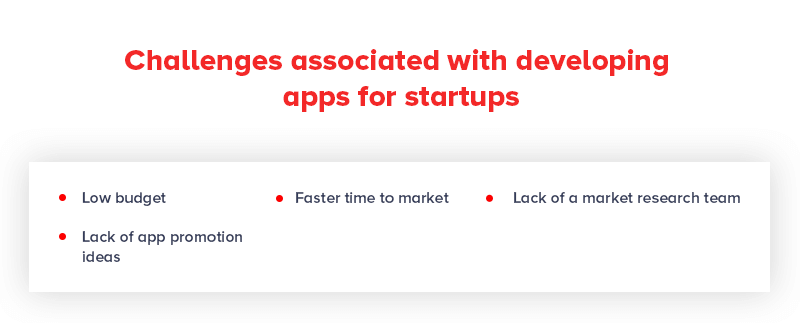The difference between Startups and Established Brands are too evidential and innumerable to ignore or list down.
Having worked with both, we understand first hand that both the entities are different not just work or culture wise, but the difference also seeps into their business model and their expectations in terms of deliveries.
While on one hand established brands, with their no shortage of funds and lower go-to market time, focus their attention on the app quality, Startups usually seek faster time to market and supreme quality at low development cost.
This difference in idea brings in a difference in deliverables as well, especially when it comes to the delivery of a product that is an extension of the brand, showcased on a platform accessed by millions of users.
The product here being mobile apps.
In this article, we will look into the different challenges app development for startups brings with it. And will give you a roadmap of how to go about with the mobile app development process as a startup.
Startup’s Mobile App Development Challenges

- Low budget
Startups usually come with a limited budget and even within that limited budget, they have to divide the funds between research, development, launch of app on the stores and its promotion after it is made live. This lack of budget is the number one reason behind the brands not investing in a mobile app development company for startups.
- Faster time to market
Startups are more often than not in a race to come on top of the competition in the market. And in that respect, they end up looking at white label solutions because it’s easier than building their own customized app, even if it means getting a low quality product.
- Lack of a market research team
Since in most cases, startups are made of a team of 2 to 10 people, the chances that they would have a team specializing in finding the mobile app solution for startup is very minimal.
This absence of a research team makes it very difficult for them to find out more about their customers.
- Lack of app promotion ideas
Noting the low budgets, the biggest problem that emerges when it comes to mobile app development for startup is limitation in terms of app marketing or promotion once it is launched on the stores.
Now that we have looked into the different challenges that the SMBs face when it comes to investing in mobile app development for startups, let us now give you a roadmap that we at Appinventiv follow in our role as a web and mobile app development company for startups.
Roadmap of App Development for Startups
Hopefully, by the time you’re done reading this post, you’ll have gained valuable insights to turn your mobile app idea into a money-generating machine.
Let’s get started-
Recognition of Customer’s Pain Point-
A thorough understanding of the problem and the customer’s pain is the first step that is to be followed by both startups and established brands. In case you don’t have the support of a team that would handle the market research part for you, invest in a startup app development company that understands the nerves of a market.
Come to think of it, if you don’t know the underlying problem, how can you even consider designing a product which provides an appropriate solution to its consumers.
Identifying your customer’s pain points and then working on developing a solution that cures their pain is what that takes you miles ahead of other competitors.
As a business owner, your ability to discover what your audience is struggling with and assuring them that you genuinely care about their problems and are ready to help them is half the battle won. In fact, it is the app discovery stage that decides the survival ability of your app.
In this oversaturated market of mobile apps startups, what makes you a key differentiator is the fact that you realize the “real needs” of your customer and then plan or devise a product or an app which caters to those actual needs. And your extra ability to adjust and adapt to these ever-changing needs of your audience is what all the more gives you a competitive edge over other mobile app builders.
In essence, it helps you define a clear goal and mission for your mobile app.
Wireframe your App
Now that you know that your app is well accepted by its customers and is evoking interest, my next advice would be to wireframe your mobile app.
A wireframe is a structural blueprint of your app that diagrammatically shows the objects on the screen and its possible functions. It has become that phase that you cannot afford to miss out from the mobile app development process.
In common language, it’s more like a plan that architects draw before constructing a house or building or you can call it your app’s skeleton.
Key advantages of wireframing your mobile app-
- You will gain a clear idea as to how your app will look like and how it will work.
- Provides you with a visual illustration as to how different elements(like buttons and menu) will appear on each screen of your application and how the user will navigate through it.
- Any bugs that might later pose a problem can be removed in this stage.
- It also gives an opportunity to update and add more features in the app if you feel like, to ensure the best usability.
Designing your App-
As they say, “For a great product, design cannot be an afterthought.”
And in your case, where you’ll probably take some time before redesigning your app, you will have to ensure that it is proper the first time on. With that respect, now is the time to put all the research done till now to use and translate your tested wireframes into final designs.
Keeping in mind all the comments and feedback of the users, you now know how you want your app to look and feel like.
Designing plays a huge role in the success of an app.
For instance, see Apple, the whole business and culture of the tech giant spins around design excellence. And as Steve Jobs has quoted, “Design is not just what it looks like and feels like. The design is how it works.”
Remember, people love and respond to beautiful things, then how can a mobile app be an exception?
Having said that, your mobile app design should focus equally on the user experience. A good app design without user-friendliness is no good and will eventually struggle to establish its foothold in the market. Simplifying the journey of your user on your app is WHAT design is all about. The fact is reiterated by the quote, “Design isn’t finished until somebody is using it.”— Brenda Laurel, PhD, Independent Scholar
If you are not short on budget, invest in a team of app designers and developers for startup. But at the same time, what helps is knowing what all elements are presently counted in the list of mobile app UI Design trends.
Build an MVP
As a startup, you cannot give in to the very common misconception that most people tend to cling to is that you need a perfect version of your product to be displayed to people. There are a number of benefits that come associated with the development of MVP in startup ecosystem.
We should not forget that all the successful apps or products that we see in the market today have gone through hundreds of improvisations and have evolved over a period of time through the consistent customer feedback.
The minimum viable product is the essence of your app which concentrates only on the core features and solves the core problems of your potential customers. In short, it is the simplest and affordable version of your mobile app idea.
It’s a concept wherein a rough prototype with “must-have features” is rolled out to help us get the honest feedback from potential customers and retail partners. It constitutes a great tool to validate your mobile app and also informs us about the aspects that need to be worked upon.
Monetisation
As a startup, it is of prime importance that you have a proper monetization strategy in place. As while established brands can afford to give user engagement a greater importance than monetization, you don’t have the same perk. So, ensure that when you are in talks with a team who has promoted itself as a team of app developers for startups, you clear your aim to make money off of your mobile app, straight away.
In order to achieve this, you will have to know which app monetization strategy is best suited for your mobile app, yourself. Depending on your app concept, there are a number of methods that you can choose from – in app advertisement, freemium apps model, etc.
Deploy and Promote your Mobile App.
You are nearly there!
So close to seeing your idea manifest. High time to put on your thinking hats to devise a perfect marketing strategy now.
Needless to say, your marketing plan should be focussed, realistic and specific to your target audience. Don’t expand your marketing budget at this stage on uncharted territories. Focus your attention on promotion medium that will get you definite result.
With that said, here are some sureshot ways to promote your app-
- Social media marketing
- Public relations
- Email marketing.
- SMS marketing.
- App Store Optimization
Since we are on the topic of app promotion, here is what even Wikipedia won’t tell you about making apps viral.
Now that you have looked into the detail of the app development stages that also act as the roadmap for your business, it’s the time to act on them. And in the least possible scenario, if you are still struggling with what is right to consider for mobile app development for startups, check out our mobile app development guide.

strategies your digital product..




